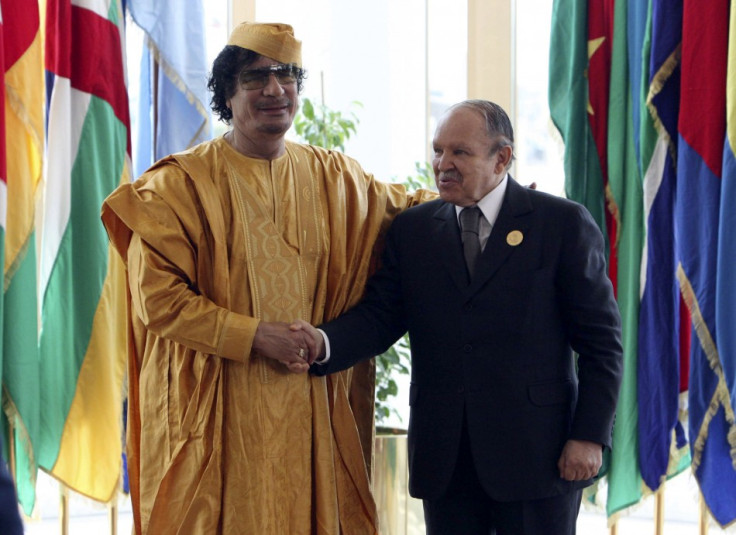Libya and Algeria: Could the Libyan Conflict Cause regional Instability?

Throughout the last six months, Algeria has been a constant feature of the conflict: imaginary or real ally of Gaddafi, the country has been accused throughout the months of sending troops, arming Gaddafi forces or sheltering the former dictator.
The Algerian government has however continually denied the allegations and as tensions between the National Transitional Council (NTC) and Algerian authorities mount, the establishment of the new Libyan government could also bring about regional instability.
The latest affair opposing the NTC and the Algerian government was the official declaration by Algerian authorities that Gaddafi's wife Safiya, his daughter Aisha and his sons, Mohammed and Hannibal and their children had found shelter in the country on Monday morning on humanitarian ground.
At the time the NTC accused the Algerian government of an "act of aggression" and analysts and politicians started to question whether Algeria had violated the UN sanctions and ban travel on the leader, proving that the country's government is still internationally seen as controversial.
Conscious of the potential diplomatic consequences of its decision, Algeria sent a letter to the United Nations explaining why it allowed members of Gadhafi's family to enter the country yesterday despite an international travel ban imposed earlier this year.
Tensions were still growing as Thursday the Algerian newspaper El-Watan quoted sources close to the Algerian presidency as saying that Gaddafi was near the border, accompanied by some members of his family.
According to the newspaper, the colonel tried to get access to the Algerian territory by contacting President Abdelaziz Bouteflika, who according to the report refused to answer the call by Gaddafi, claiming he was "busy."
While the Libyan council publicly reacted harshly to Algeria's decision to shelter some members of Gaddafi, El-Watan on the other hand insists their entry on the territory came following an approval and guarantees from some members of the National Transitional Council of Libya.
Another point of discord between Algeria and many of his detractors is the extent of Islamic fundamentalist in the country. Despite publicly vowing to fight off terrorism, Algerian authorities have often been accused of harbouring terrorists groups, which looking at the country's history seems rather unlikely.
In the 1990's Algeria was rocked by a Civil War which opposed the Algerian government and various Islamist rebel groups. The armed conflict began in 1991 and is said to have cost between 150,000 and 200,000 lives, and the Algerian civil society is still bearing the scars and traumas of the Islamic-orientated insurgencies.
While it is clear that Islamist groups are still present and active throughout the country, they were recently accused of training members of the Nigeria Militant group Boko Haram, those militias first and foremost represent an opposition and stand in opposition to the government.
Seen in this light, it becomes more comprehensible that Algeria's fears regarding the Libyan conflict is that it could end up further fuelling Islamism militancy and insurgency in the region.
With arms flowing, many are being sold on the black market, analysts have warned insurgency groups will be the first to benefit from all the light weaponry available, while as long as Gaddafi is on the run, nothing excludes a possible alliance between the former leader and organisations such as al-Qaeda.
At least this is what Algerian authorities fear as Mourad Medelci, Algeria's foreign minister, said the government is convinced the North African branch of al-Qaeda has obtained weapons originating from the Libyan conflict on the black market.
Medelci also insisted that countries across North Africa have seen proof "on the ground" that al-Qaeda had directly beneficiated from the instability in Libya.
"It's not just a worry or a feeling, it's a certainty," Medelci said in an interview on French radio station Europe 1.
More problems are set to interfere in Libyan-Algerian relations after a state official who spoke under the condition of anonymity told the press Wednesday that, "About 500 Tuaregs were being pursued by the rebels. They fled [into] Libyan territory and, for humanitarian reasons, we couldn't refuse them entry."
Following violent insurgencies in Mali and Niger in the 1990s, and between 2006 and 2009, tens of thousands of Tuaregs took refuge in Libya but tensions mounted after the NTC forces insisted the Tuaregs fought for Muammar Gaddafi and Algeria has warned the refugees are leaving Libya for fear of persecution.
Security sources in Mali also said this week that hundreds of Tuaregs had started returning from the Libyan front, raising fears of conflict.
As Gaddafi was ousted the regional balance between Libya and its neighbour could also suffer from the chaotic situation reigning in the country.
The sooner the Council takes full control of the country, the better it will be for Libya but also for the rest of the region. Distribution of weapons to pro and anti Gaddafi forces during the conflict will now be hard to trace and concerns of Islamist terrorist groups obtaining new military material on the blacks markets are a reality. As Algeria was never one of the closest allies of Gaddafi, it is surprising that the country has been such a recurrent feature of the conflict. With light weapons easily available throughout the region, and ethnic tensions threatening to resurface, the next months of transition could prove vital not only for Libya, but also for the rest of the region.
© Copyright IBTimes 2024. All rights reserved.





